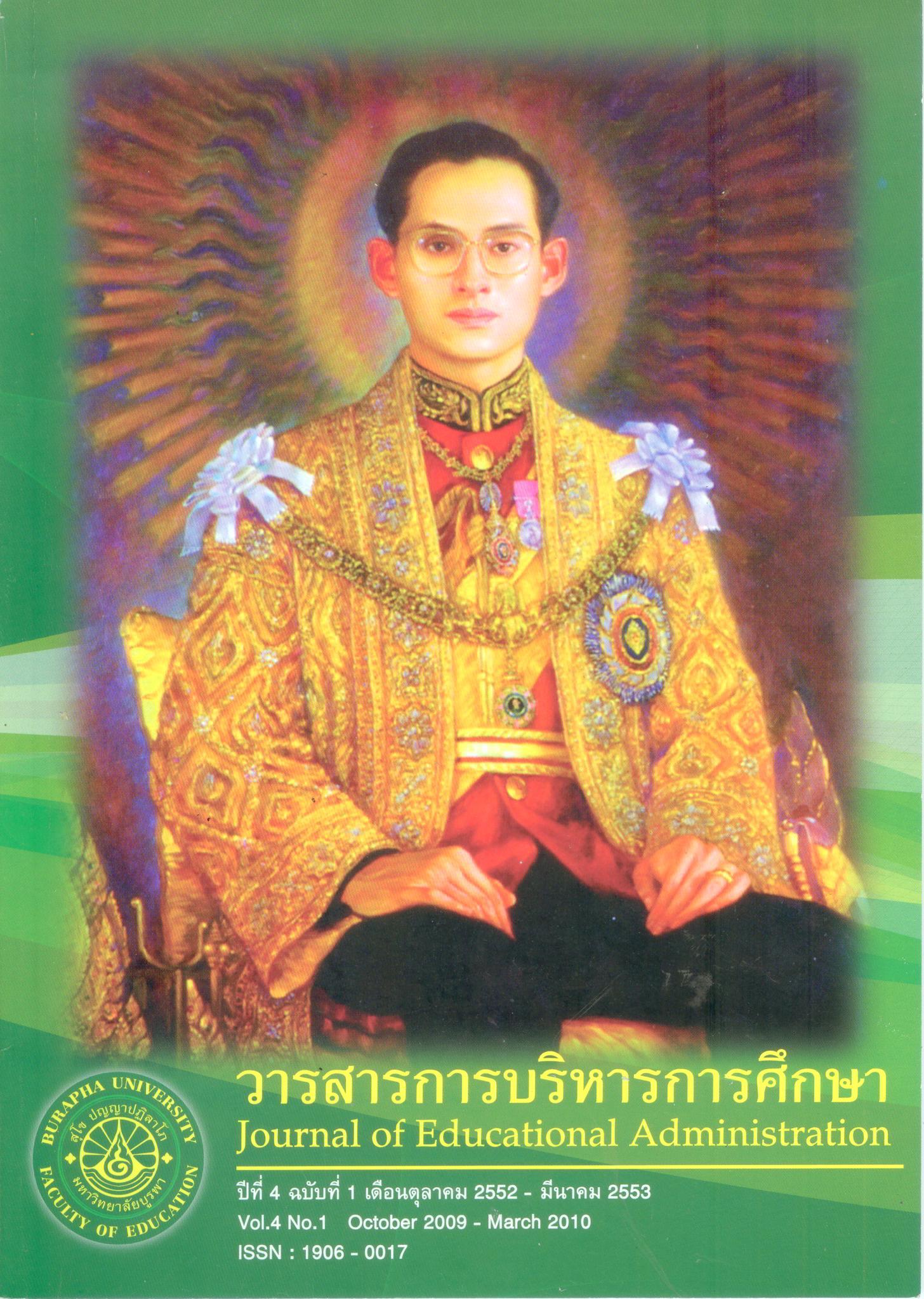ปัจจัยบรรยากาศโรงเรียนกับองค์การแห่งการเรียนรู้ที่ส่งผลต่อ ประสิทธิผลของโรงเรียน สังกัดสำนักงานเขตพื้นที่การศึกษาสระแก้ว SCHOOL CLIMATE AND LEARNING ORGANIZATION FACTORS AFFECTING SCHOOL EFFECTIVENESS OF SCHOOLS UNDER THE OFFICE OF SAKAEO EDUCATIONAL ...
Abstract
บทคัดย่อ
การวิจัยครั้งนี้มีวัตถุประสงค์เพื่อศึกษาระดับของบรรยากาศโรงเรียน องค์การแห่งการเรียนรู้ของโรงเรียน และประสิทธิผลของโรงเรียน สังกัดสำนักงานเขตพื้นที่การศึกษาสระแก้ว และความสัมพันธ์ระหว่างบรรยากาศโรงเรียนกับองค์การแห่งการเรียนรู้ที่ส่งผลต่อประสิทธิผลของโรงเรียน กลุ่มตัวอย่าง ได้แก่ครูผู้สอนในโรงเรียน สังกัดสำนักงานเขตพื้นที่การศึกษาสระแก้ว จำนวน 361 คน เครื่องมือที่ใช้ในการเก็บรวบรวมข้อมูลเป็นแบบมาตราส่วนประมาณค่า 5 ระดับ สถิติที่ใช้ในการวิเคราะห์ข้อมูล ประกอบด้วย คะแนนเฉลี่ย () ความเบี่ยงเบนมาตรฐาน (SD) สัมประสิทธิ์สหสัมพันธ์แบบเพียร์สัน (r) และการวิเคราะห์การถดถอยพหุคูณแบบขั้นตอน (Stepwise Multiple Regression Analysis)
ผลการวิจัย พบว่า
1. บรรยากาศโรงเรียน ด้านบรรยากาศแบบเปิด และบรรยากาศแบบผูกพัน อยู่ในระดับมาก บรรยากาศแบบไม่ผูกพัน อยู่ในระดับปานกลาง และบรรยากาศแบบปิด อยู่ในระดับน้อย
2. องค์การแห่งการเรียนรู้ของโรงเรียน และประสิทธิผลของโรงเรียน อยู่ในระดับมาก
3. ปัจจัยบรรยากาศโรงเรียนด้านบรรยากาศแบบเปิดและองค์การแห่งการเรียนรู้ ด้านความรอบรู้แห่งตน แบบแผนความคิดอ่าน การมีวิสัยทัศน์ร่วม การเรียนรู้เป็นทีม และความคิดเชิงระบบมีความสัมพันธ์ทางบวกกับประสิทธิผลของโรงเรียน ในระดับสูง อย่างมีนัยสำคัญทางสถิติที่ระดับ .01 บรรยากาศโรงเรียนด้านบรรยากาศแบบผูกพันมีความสัมพันธ์ทางบวกกับประสิทธิผลของโรงเรียน ในระดับค่อนข้างต่ำ อย่างมีนัยสำคัญทางสถิติที่ระดับ .01 บรรยากาศโรงเรียนด้านบรรยากาศแบบไม่ผูกพัน และบรรยากาศแบบปิดมีความสัมพันธ์ทางลบกับประสิทธิผลของโรงเรียนในระดับต่ำ อย่างมีนัยสำคัญทางสถิติที่ระดับ .05
4. ปัจจัยบรรยากาศโรงเรียนด้านบรรยากาศแบบเปิด และองค์การแห่งการเรียนรู้ ด้านการเรียนรู้เป็นทีม ความคิดเชิงระบบ และความรอบรู้แห่งตน สามารถพยากรณ์ประสิทธิผลของโรงเรียนสังกัดสำนักงานเขตพื้นที่การศึกษาสระแก้วได้ร้อยละ 73.90 เขียนเป็นสมการในรูปคะแนนดิบดังนี้
= .538 + .269(X8) + .297(X1) + .217(X9) + .097(X5)
ABSTRACT
The purposes of the study were to examine school climate and learning organization affecting school effectiveness of schools under the Office of Sakaeo Educational Service Area, as well as to study relationship between school climate and learning organization factors that can predict the effectiveness schools. The sample used for the study were 361 teachers in the schools under the Office of Sakaeo Educational Service Area. The research instrument used for the study was a rating-scale questionnaire. Statistics used for analyzing the data were mean standard deviation, Pearson’s product moment correlation, and stepwise multiple regression.
The findings were as follows:
1. Open Climate and Engaged Climate were at a high level, Disengaged Climate was at a moderate level and Closed Climate was at a low level.
2. Learning organization and schools effectiveness were at a high level.
3. Open Climate and learning organization in personal mastery, mental models, shared vision, team learning and systematic thinking had a significant positive correlation with school effectiveness (p <.01) at a highest level. Engaged Climate had a significant positive correlation with school effectiveness (p < .01) at a rather low level, Disengaged Climate and Closed Climate had a significant positive correlation with school effectiveness (p < .05) at a low level.
4. The Open Climate (X1) of school climate and team learning (X8), systematic thinking (X9), personal mastery (X5) of learning organization could account for 73.90 percent of the variance of school the effectiveness of schools under the Office of Sakaeo Educational Service Area and could be written in the form of raw score equation as follows:
= .538 + .269(X8) + .297(X1) + .217(X9) + .097(X5)


